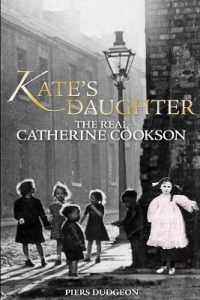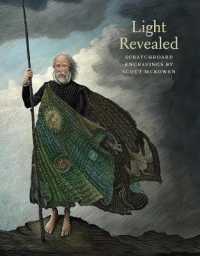- ホーム
- > 洋書
- > 英文書
- > Literary Criticism
Full Description
Howard Frank Mosher has spent the greater part of his career depicting a relatively isolated section of Vermont known as the Northeast Kingdom. Yet, even as he writes about that particular area in the Green Mountain State, he is investigating age-old themes from among the best English and American literary works. His first novel, Disappearances (1977), signaled the arrival of a master craftsman harkening us back to Melville's Billy Budd and Moby-Dick, in terms of humankind's struggle against an ever present evil.
A full 33 years after the publication of his first novel, the Vermont author, in Walking to Gatlinburg (2010), examined the polarity between cowardice and honor. In the intervening years, between Disappearances and Gatlinburg, Mosher explored crucial matters such as the disappearing wilderness, industrialization, black male/white female encounters, the necessity of humor, the quest for salvation, and the immortality of romantic love, all issues that he delved into as he staked out a unique terrain within the pantheon of Bunyan, Shakespeare, Dreiser, Twain, Faulkner, Steinbeck, Harper Lee, and others.
Contents
Table of Contents
Acknowledgments
Preface
Introduction
I. First Chancellorsville, Then Gettysburg: Horror, Escape and Restitution in Crane's The Red Badge of Courage and Mosher's Walking to Gatlinburg
II. Female Vulnerability and Industrialization's Dehumanizing Process in Mosher's Marie Blythe, Sinclair's The Jungle, Dreiser's Sister Carrie and Crane's Maggie: A Girl of the Streets
III. The Journey to Salvation in Bunyan's The Pilgrim's Progress and Mosher's Walking to Gatlinburg
IV. Good, Evil, and the Mystery of Life in Mosher's Disappearances and Melville's Moby-Dick and Billy Budd
V. "The unmitigated temerity to 'feel sorry' for a white woman" in Lee's To Kill a Mockingbird and Mosher's A Stranger in the Kingdom
VI. The Technique of Humor in Twain's Huckleberry Finn and Mosher's The True Account
VII. Faulkner's Go Down, Moses and Mosher's Mourning the Inevitable Loss of a Kingdom
VIII. Mosher and Shakespeare: On the Immortality of Romantic Love
Conclusion: "Not Gently" in Steinbeck's Travels with Charley, Twain's The Innocents Abroad and Mosher's The Great Northern Express
Notes
Bibliography
Index








